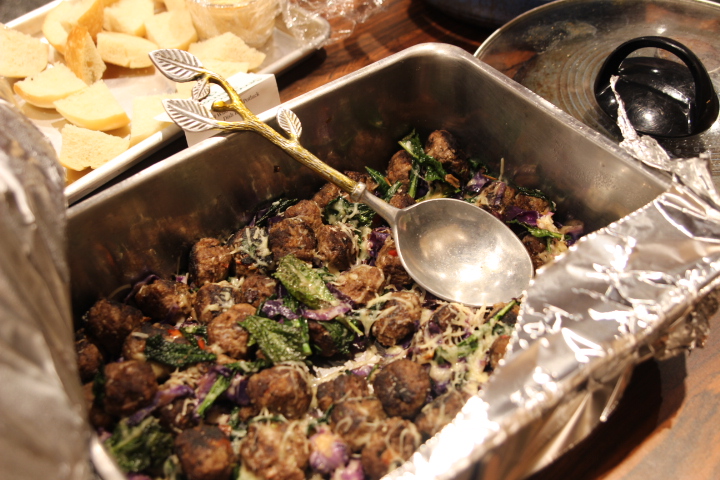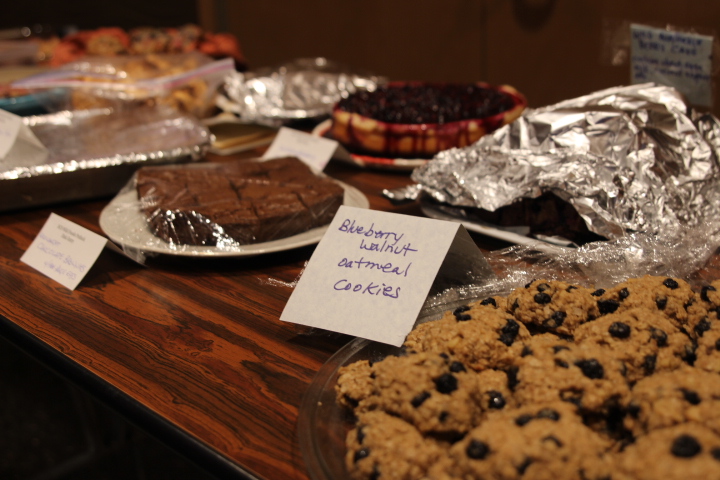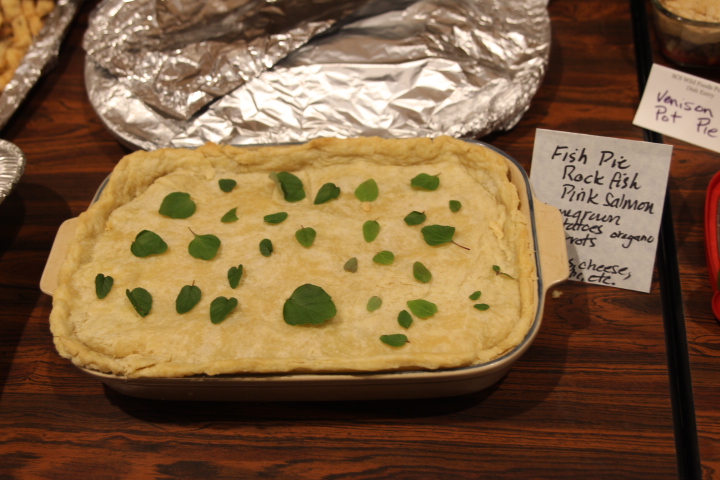Each November, the community gathers for its Wild Foods Potluck, bringing together family and friends from near and far.
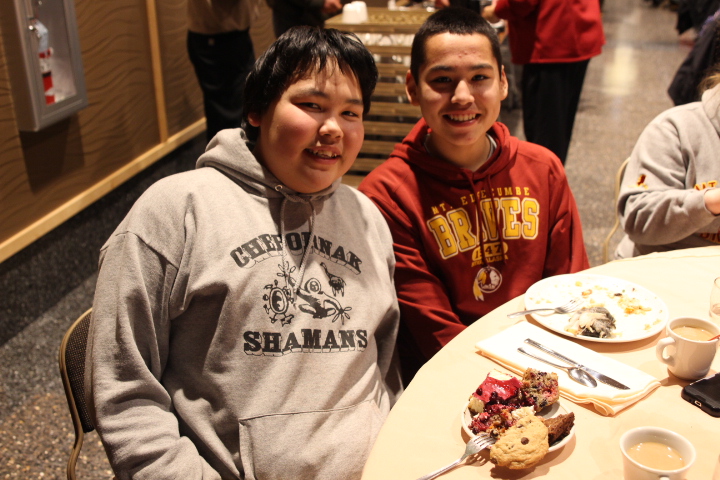
If you think your Thanksgiving is the biggest, most mouth-watering meal of the year, then you haven’t been to Sitka’s Wild Foods Potluck. Long tables covered with casserole dishes of all shapes and sizes line the walls of the city’s newly renovated Harrigan Centennial Hall. Smells of soups and stews, cakes and cobblers waft through the air.
Sophie Nethercut is Sitka Conservation Society’s community organizer.
“It’s our way to say ‘thank you,’ to the community,” Nethercut said.
SCS has hosted the Wild Foods Potluck every November, for the last fifteen years.
“Who doesn’t love the idea of bringing a dish and coming to a space where their taste buds can go crazy all night?” Nethercut said.
And go crazy, they most certainly will. Hundreds of people carry in platters of food they’ve either hunted or harvested. There are jars of stringy green beach asparagus, plates of shiny black cod tips, and no shortage of salmon dips.
The dishes are as diverse as the crowd. Fishermen and their families fill chairs, kids crawl underneath tables, and people mingle in line.
Zoe Trafton is in line, but she’s not mingling. She’s 10 and her plate is almost full. She described the variety of food on her plate.
“A meatball, herring egg sushi– my family made it– some ribs, some venison stew, I’m not totally sure what that is, some mac ‘n cheese, pumpkin bread, and gnocchi,” Trafton said.
There’s a lot going on on Trafton’s plate, and that’s just a sliver of what diners can choose from. There’s a full spectrum of flavors, from sweet applesauce, savory stews, and even some spiciness thrown into the mix.
A woman with her young daughter, who can’t be more than four years old, grabs a handful of fries. She said her daughter’s first food was salmon eggs, so spicy kelp fries don’t scare her.
Behind them in line is Ellen Frankenstein. She’s here with her husband and said the potluck is one of Sitka’s best events.
“It is really wonderful, because one thing we can still do is share food and protect our resources and be connected to each other and what we care about.” Frankenstein said. “And,“look for what is actually common between us.”
She passed by her own dish since her plate was already piled high.
“I have some Chicken of the Woods curry, I think I have some black cod, I have some caribou sausage, I have some chowder I think made by high schoolers,” Frankenstein listed.
“My name is Moses Wiseman. I’m from Chefornak. It’s far away, but I go to [Mt.] Edgecumbe, which is a boarding school here.”
Moses Wiseman is from Chefornak, but he goes to the Mt. Edgecumbe boarding school in Sitka. Wiseman said the food here is pretty fancy, but really good. It made him think of the small village he’s from — on the Yukon Delta.
“When somebody catches a bearded seal they take the guts out and a boy starts biting on it,” Wiseman recalled. “When they come home the mother or the girls start cleaning it. After it’s really clean, then you rinse it. You cook it or you can eat it raw.”
Wiseman is sitting next to his friend Christian Charlie. Charlie is also a student at Mt. Edgecumbe High School and is from Marshall, a village north of Chefornak on the Yukon River.
Charlie is chewing on fry bread at the moment, a staple in many Alaska Native villages.
“The food here is different, but it’s really good,” Charlie said. “It makes you think of home.”
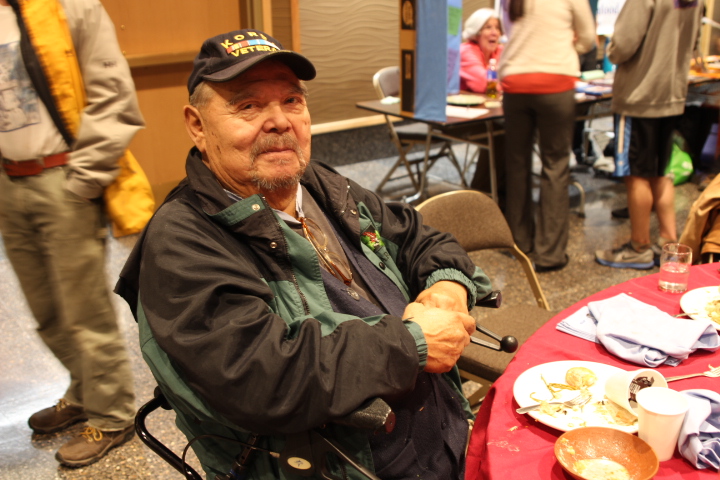
A few tables away, Nelson Frank gears up for dessert. Frank is from Sitka and grew up subsisting off the land and the sea. He’s 70 now, and doesn’t do much hunting or harvesting anymore. He praised whoever brought smoked salmon to the potluck, which he said was perfect. But there were a few things Frank missed tonight.
“I only wished that they had some more traditional food, like fermented eggs,” Frank said.
Mixed with berries, Frank said, they make for a delicious dessert.
“Kanéegwál’. Salmon– fermented eggs– and highbush cranberries,” Frank clarified.
For all you fishing and foraging out there, Frank is looking at you to round out the dessert table at next year’s Wild Foods Potluck
Emily Russell is the voice of Alaska morning news as Alaska Public Media’s Morning News Host and Producer.
Originally from the Adirondacks in upstate New York, Emily moved to Alaska in 2012. She skied her way through three winters in Fairbanks, earning her Master’s degree in Northern Studies from UAF.
Emily’s career in radio started in Nome in 2015, reporting for KNOM on everything from subsistence whale harvests to housing shortages in Native villages. She then worked for KCAW in Sitka, finally seeing what all the fuss with Southeast, Alaska was all about.
Back on the road system, Emily is looking forward to driving her Subaru around the region to hike, hunt, fish and pick as many berries as possible. When she’s not talking into the mic in the morning, Emily can be found reporting from the peaks above Anchorage to the rivers around Southcentral.


